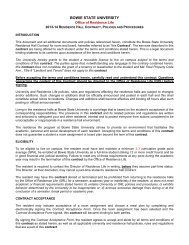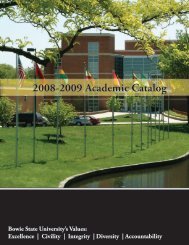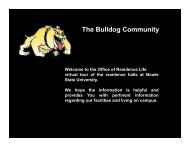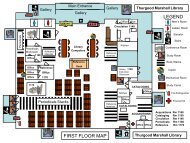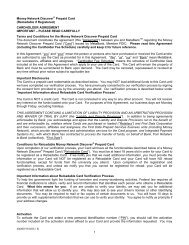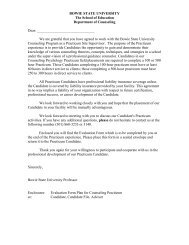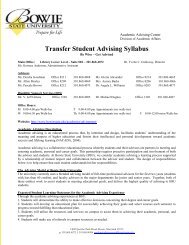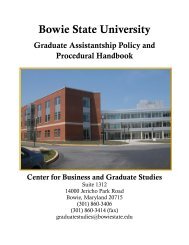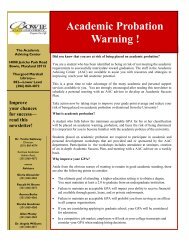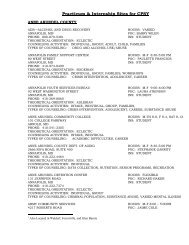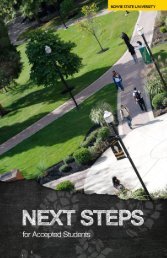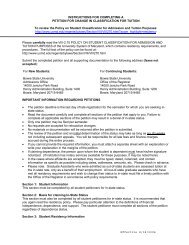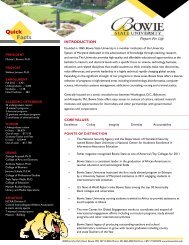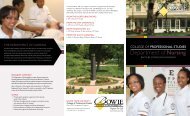2009-2010 - Bowie State University
2009-2010 - Bowie State University
2009-2010 - Bowie State University
Create successful ePaper yourself
Turn your PDF publications into a flip-book with our unique Google optimized e-Paper software.
MUSC 465 PERCUSSION CLASS METHODS (Spring Only) 3 Credits<br />
Prerequisite: Junior Level Standing Mandatory. Students will learn fundamental concepts of percussion equipment and its organization,<br />
performance skills, and pedagogical skills applicable in K‐12 school music programs. Course topics include organization of the school percussion<br />
program, teaching rhythm, equipment selection and maintenance, sound production concepts, fundamental instrumental techniques, and<br />
pedagogical techniques and methods of private and group instruction. Instruments studied include concert snare drum, marching percussion,<br />
keyboard percussion, orchestral accessories, Latin percussion, timpani, and jazz drum set. Study the organizational skills and information<br />
required to develop a quality percussion program, including instrument purchasing, maintenance, inventory, storage, and transport.<br />
MUSC 468 ELEMENTARY & SECONDARY STUDENT TEACHING (Fall, Spring) 12 Credits<br />
Prerequisite(s): Senior Level Standing in Music Teacher Education, completion of all methods courses and Praxis II. In this course the student<br />
participates in all of the activities of the teacher in the classroom, in the school, and in the community. Beginning with a period of observation<br />
and orientation, the student receives assignments of increasing difficulty from the cooperating teacher until he/she is capable of assuming full<br />
responsibility for teaching. The semester is divided into an eight‐week assignment in the intermediate and an eight‐week assignment in the<br />
primary grades. The practical experience is accompanied by a regularly scheduled seminar. The student teacher follows the entire schedule of<br />
the school at which the student is placed.<br />
NURS:<br />
NURSING COURSE DESCRIPTIONS<br />
IDIS 210 Women’s Health Issues 3 Credits<br />
This lecture course examines selected women's health issues. Special emphasis is placed on physical and psychological changes that occur<br />
throughout a woman's cycle, with special consideration given to diverse populations. Students gain a better understanding of preventive health<br />
practices, common health concerns, and resources available to address these concerns. This course is open to anyone interested in the health<br />
of women in America. Non‐nursing majors only<br />
Lecture<br />
IDIS 450 Alternative Interventions for Health and Wellness 3 Credits<br />
This is a survey course designed to examine relationships among the human, body, mind, behavior, and health states. Various modes for<br />
interventions with human coping, health promotion, and wellness maintenance will be explored as alternatives or complements to more<br />
traditional approaches to the human health dilemma. Emphasis is given to increasing students’ level of knowledge about alternative<br />
intervention practices and to selected practical applications.<br />
Lecture<br />
IDIS 460 Transcultural Health and Wellness 3 Credits<br />
The course content is designed to increase students’ knowledge level and professional awareness concerning health and wellness practices in a<br />
transcultural society. Theoretical models and data collection guides are used to explore the ways and conditions under which individuals define<br />
their health status and implement health practices. Cultural factors that may influence illness behaviors and health promotion activities are<br />
examined.<br />
Lecture<br />
IDIS 470 Ethical Issues in Health Care 3 Credits<br />
This lecture/discussion course is designed to introduce students to the basic concepts, theories, principles, and critical thinking processes<br />
relevant to health care ethics. Content will focus on ethical issues commonly encountered in daily practice in health care and in health care<br />
delivery systems. Important ethical issues in health care and health care delivery will be reviewed and analyzed. The pivotal role of the health<br />
care practitioner in the quality of day‐to‐day delivery of care and the changing health care system will be addressed from an ethical perspective.<br />
Lecture<br />
NURS 101 Professional Nursing Perspectives<br />
2 Credits<br />
The content of this course is designed to introduce students to the profession of nursing. Historical aspects of nursing and the health care<br />
delivery system will be discussed. Content will also focus on the concepts needed to form therapeutic nursing relationships with clients.<br />
Concepts related to the discipline of nursing will be introduced as the foundation for continued study.<br />
Prerequisites: Completion of Math 125/141 and Engl 101 with a grade of “C” or better<br />
Lecture<br />
NURS 201 Foundation of Nursing Practice I<br />
3 Credits<br />
This course introduces the student to the scientific principles of foundational concepts, theory and technical skills. Concepts that frame the<br />
curricula are introduced: caring behaviors, communication, culturally congruent care, ethical frame work, legal aspects, critical thinking,<br />
leadership, research and professional nursing role. Using simulated labs, computer programs and videotapes, the student will develop and<br />
master selected psychomotor skills.<br />
Prerequisites: Admission to the Baccalaureate Nursing Program, NURS 101, BIO 311, CHEM 107<br />
Lecture/Laboratory<br />
NURS 203 Foundation of Nursing Practice II<br />
4 Credits<br />
This course builds on the concepts and principles presented in Foundation of Nursing Practice I. There will be a continued focus on the<br />
application of the nursing process, and the ongoing development of competencies in providing care for individuals using basic nursing skills in<br />
the clinical settings. Learning opportunities are provided in the classroom, and the skills laboratory, to enable students to apply skills and<br />
theory. In addition, therapeutic communication techniques in nurse client interactions are developed. Students are introduced to research and<br />
<strong>Bowie</strong> <strong>State</strong> <strong>University</strong> 379




